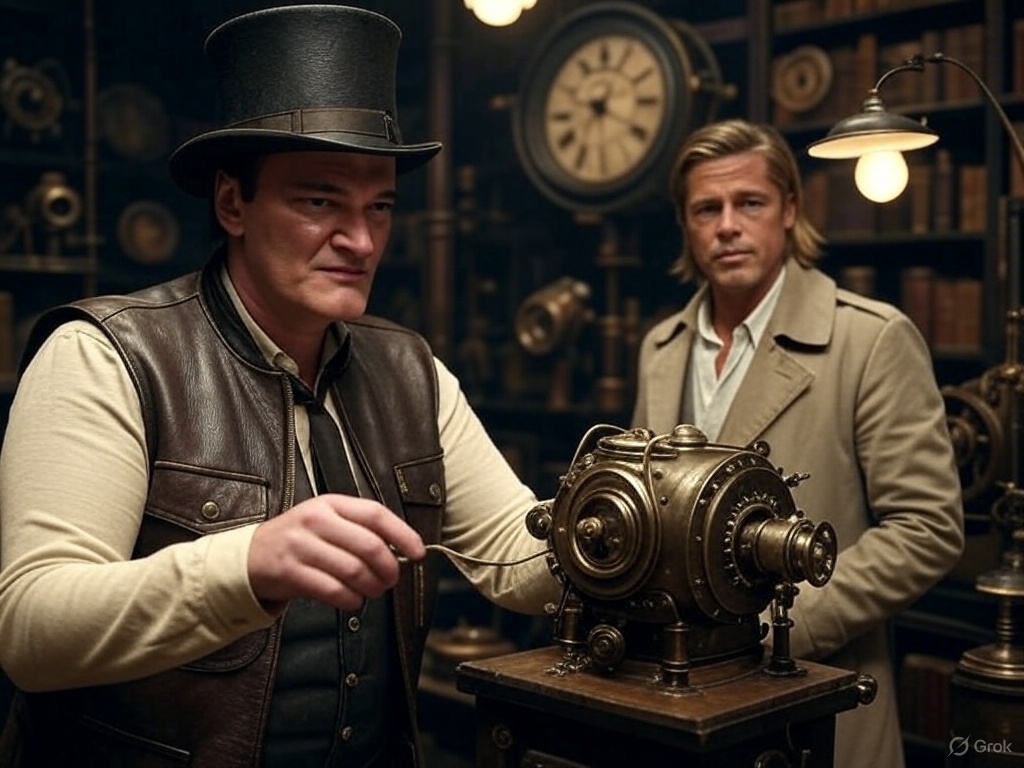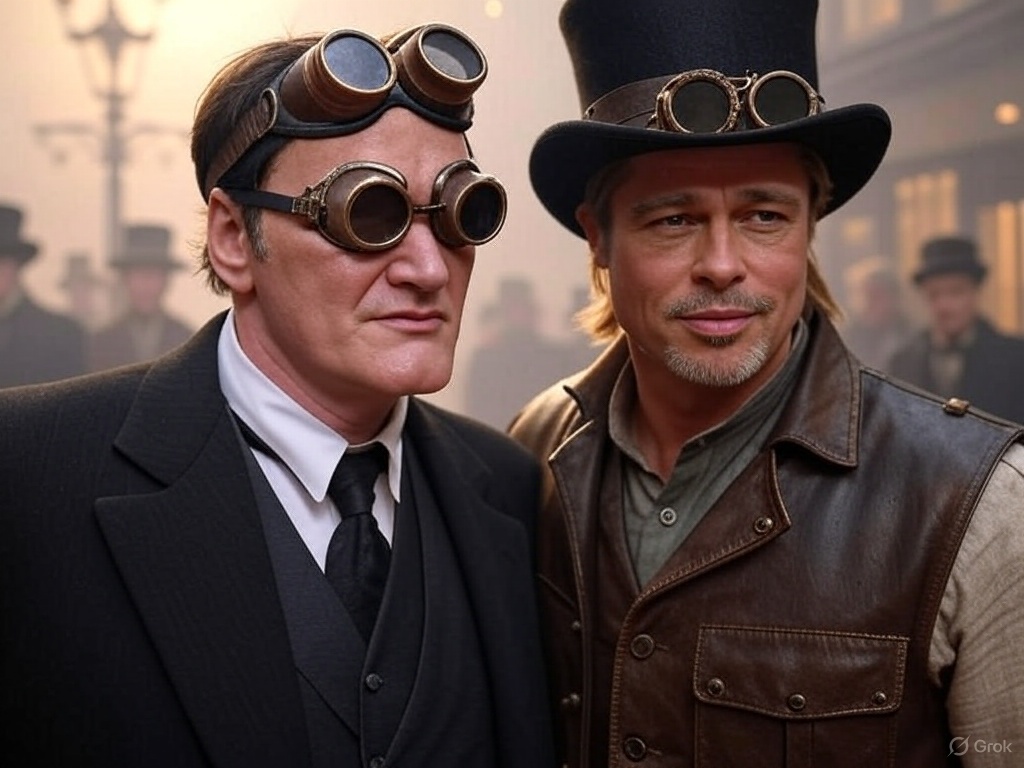In a recent statement that has sparked heated debate across the film industry, acclaimed director Quentin Tarantino proclaimed that 2019 marked the "last year of movies" as we once knew them, before streaming platforms fundamentally altered the cinematic landscape.
 Known for his bold opinions and reverence for traditional filmmaking, Tarantino expressed his frustration with the rapid shift in how films are consumed today, a sentiment that resonates with many purists in the industry.
Known for his bold opinions and reverence for traditional filmmaking, Tarantino expressed his frustration with the rapid shift in how films are consumed today, a sentiment that resonates with many purists in the industry.
"What the fuck is a movie now?" Tarantino reportedly questioned, as shared in a post on X by @CultureCrave on January 28, 2025.
He went on to critique the modern release model: "Something that plays in theaters for a token release of four fucking weeks? And by the second week, you can watch it on [your] TV? I didn’t get into the details of distribution, but after 2019, it got so much worse."
His comments reflect a growing concern among filmmakers about the erosion of the theatrical experience, which has long been considered the heart of cinema.
Tarantino’s remarks point to 2019 as a pivotal year, one he believes showcased the last stand of original cinema before streaming giants like Netflix and Disney+ tightened their grip.
That year saw the release of several critically acclaimed and commercially successful films, including Parasite, Once Upon a Time in Hollywood, Ford v Ferrari, Avengers: Endgame, and 1917.
 These films, representing a mix of independent artistry and blockbuster spectacle, dominated awards circuits and box offices alike.
These films, representing a mix of independent artistry and blockbuster spectacle, dominated awards circuits and box offices alike.
Parasite, directed by Bong Joon-ho, made history as the first non-English-language film to win the Academy Award for Best Picture, while Tarantino’s own Once Upon a Time in Hollywood earned Brad Pitt an Oscar for Best Supporting Actor and was lauded for its nostalgic portrayal of 1960s Los Angeles.
Meanwhile, Ford v Ferrari captivated audiences with its high-stakes drama, Avengers: Endgame concluded a monumental chapter of the Marvel Cinematic Universe, and 1917 stunned viewers with its technical brilliance, often shot to appear as a single continuous take.
Tarantino’s argument hinges on the idea that these films thrived in an era where theatrical releases still held cultural primacy. In 2019, going to the cinema was an event—whether for the communal experience of a superhero epic or the prestige of an auteur-driven narrative.
 However, the rise of streaming has compressed release windows, with many films now available on digital platforms mere weeks after their theatrical debut.
However, the rise of streaming has compressed release windows, with many films now available on digital platforms mere weeks after their theatrical debut.
This shift, Tarantino argues, diminishes the sanctity of the big screen experience, reducing films to disposable content rather than cultural milestones.
The director’s perspective isn’t without merit. Data from the time supports the notion that 2019 was a strong year for original cinema.
According to reports, films like Joker, Once Upon a Time in Hollywood, 1917, Little Women, and Ford v Ferrari were among the most-watched Best Picture nominees in over a decade, proving that audiences still craved diverse storytelling.
 Yet, the same year saw the overwhelming dominance of franchise films like Avengers: Endgame, which Tarantino himself has criticized as part of a broader "war" against original cinema, a sentiment he shared in a 2020 interview with Deadline.
Yet, the same year saw the overwhelming dominance of franchise films like Avengers: Endgame, which Tarantino himself has criticized as part of a broader "war" against original cinema, a sentiment he shared in a 2020 interview with Deadline.
He noted that while franchise films had their best year in 2019, they also overshadowed smaller, more innovative projects, a trend that has only intensified with streaming’s rise.
On the other hand, streaming platforms have democratized access to cinema, allowing global audiences to experience films that might never have reached their local theaters.
 Films like Parasite gained unprecedented international traction thanks to digital availability, and streaming has given a platform to independent filmmakers who might otherwise struggle to secure theatrical distribution.
Films like Parasite gained unprecedented international traction thanks to digital availability, and streaming has given a platform to independent filmmakers who might otherwise struggle to secure theatrical distribution.
However, this comes at the cost of the theatrical experience, which Tarantino and others argue is integral to the art form. The communal aspect of watching a film in a darkened theater, the anticipation of a premiere, and the prestige of a prolonged theatrical run are all elements that streaming cannot replicate.
Tarantino’s nostalgia for 2019 also glosses over some of the industry’s pre-existing challenges. Even in that year, the theatrical model was under strain, with blockbuster franchises like Star Wars and Marvel dominating marketing and screen space, often at the expense of smaller films.
 The success of Avengers: Endgame — which grossed nearly $2.8 billion worldwide—highlighted the growing divide between tentpole releases and everything else, a divide that streaming has since exacerbated by prioritizing algorithm-driven content over artistic risk.
The success of Avengers: Endgame — which grossed nearly $2.8 billion worldwide—highlighted the growing divide between tentpole releases and everything else, a divide that streaming has since exacerbated by prioritizing algorithm-driven content over artistic risk.
As the film industry continues to evolve, Tarantino’s comments serve as a rallying cry for those who believe cinema’s essence lies in its theatrical roots.
Whether 2019 truly was the "last year of movies" remains a matter of perspective, but it’s undeniable that the rise of streaming has reshaped the medium in ways that continue to challenge filmmakers, audiences, and the very definition of what a movie is.
 Also read:
Also read:
- MrBeast’s YouTube Earnings Leaked: $4 Million a Month, Matching LeBron James’ Lakers Salary
- Sophie Rain’s OnlyFans Earnings Surpass $50 Million: A 20-Year-Old’s Journey to $100 Million in 2025
- Instagram Head Adam Mosseri Addresses Video View Algorithm: It’s All About the First 10 Seconds
For now, Tarantino’s words remind us of a time when films like Parasite and 1917 could still command the world’s attention on the big screen — a time that may never come again.






